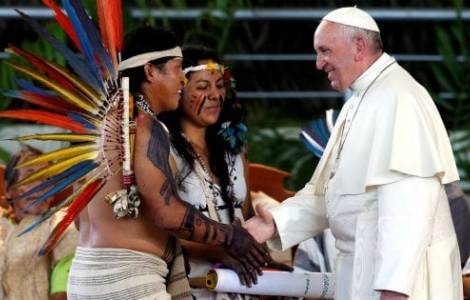
Internet
Puerto Maldonado (Agenzia Fides) - "The existence of these groups is frequently denied or made invisible, which in many cases facilitates the authorization of economic activities that directly affect their territories". "Despite the international regulatory framework that protects their rights, we verify that these rules are systematically ignored by the States".
This is the denunciation of the operators of the Pan-Amazon Ecclesial Network (Repam) and of the associated institutions in the meeting held from 5 to 8 July in Puerto Maldonado, Peru, published in their "Declaration in defense of the life of indigenous peoples in voluntary isolation (PIIV)". Indigenous groups are defined as "in voluntary isolation" or "not contacted" who, following the invasion of their territory, have been saved from extermination, have managed to avoid being scattered and have chosen not to intergrate with the Western lifestyle, opting not to maintain contact with the "white" civilization and to preserve their autonomy. Talking to Agenzia Fides, the lay missionary of the Consolata Luis Ventura, of the Missionary Indigenist Center (CIMI) of Brazil, explained that the PIIV "are subjected to very serious threats, which always increase more pressure"." People in voluntary isolation have made this decision starting from traumatic situations, very often tragic, and the contacts that take place often end in tragedy.
This is why we must have a profound respect, from an ethical point of view, for what they have decided and guarantee the protection of their territory, which ultimately allows them to preserve their own life". Also in Puerto Maldonado, as in the first meeting held in Cuiabá, Brazil, last April, there were "representatives of indigenous communities who have contacts with communities in voluntary isolation, who know where they are and where they live, and representatives of peoples contacted recently - 20 or 30 years ago - , is very important to allow us to better understand the situation through the sharing of their experience. "Brazil, Peru and Ecuador were represented, while Bolivia provided the latest data available only in these four countries, not counting Colombia, Venezuela and perhaps la Guiana, "about 150 peoples or parts of peoples in voluntary isolation are calculated, a consistent reality that must be respected". The document of the meeting denounces that "forced contacts continue to take place and the invasion of spaces (of PIIV) continues in a scenario of omission by the States, situations that expose indigenous peoples and different forms of violence and even massacres" .
Ventura illustrated to Fides the work of Repam and its partners - CIMI, the Coordination of Indigenous Organizations of the Brazilian Amazon-COIAB, the Amazon Center of Anthropology and Practical Application- CAAAP, the Federal University of Amazonas and the Vicariates of Aguarico (Ecuador) and Madre de Dios (Peru): "We obtain information about the places where PIIV live through people generally indigenous people close to their territories that signal us sightings, random encounters, detect their vestiges in the forest or collect stories about their presence in the past, which make their persistence possible in the area. There are also reports from workers and forestry workers who meet in the forest or argue with them, and then we try to determine with the greatest possible precision the information received and to contrast it with those of the State's indigenist organism". The data remain confidential, "so that they do not fall into the hands of groups or people for reasons opposed to ours", specifies the missionary. "As soon as we identify signs of their presence or when we reach places where the locals tell us about this possibility, we go away. Our intention is to protect and enforce their decision of voluntary isolation". "PIIV are subjects of law", emphasizes Ventura. Following the meeting in early July, three levels of work were established. The first is pan-amazonian: "the articulation between all those involved in the defense of PIIV in individual countries, to have a common vision, socializing legal knowledge, working methods and strategies used locally for contacts with States to influence policies and public opinion". At a national level, we aim at making a common front in the country and to protect the PIIV in border areas, where the natives move "without paying attention to the national limits" (it is their right recognized by international law, Ed.). The third level is ecclesial: "to bring this problem to the Church and to society, also in the context of the synod process for the Amazon. Welcoming and defending the rights of the PIIV is the key to the development of the region we want". The Pope underlined it in Puerto Maldonado", in January. "(...) This concern gives rise to our basic option for the life of the most defenceless. I am thinking of the peoples referred to as “Indigenous Peoples in Voluntary Isolation” (PIAV). We know that they are the most vulnerable of the vulnerable. (...)Continue to defend them. Their presence reminds us that we cannot use goods meant for all as consumerist greed dictates" (Pope Francis, Puerto Maldonado, 19 January 2018) (SM) (Agenzia Fides, 31/07/2018)